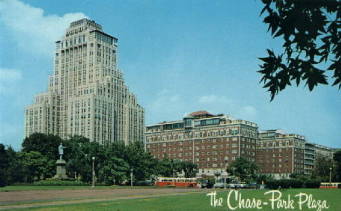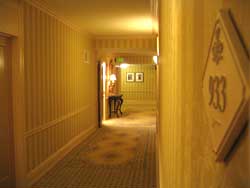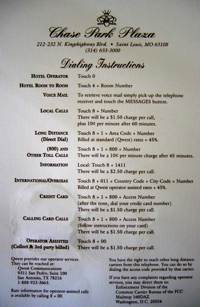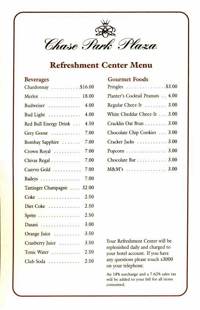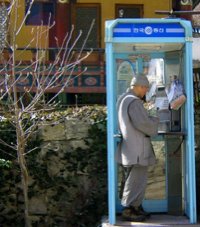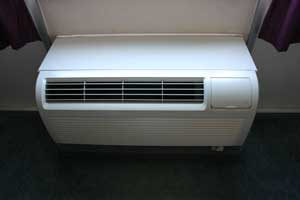
|
|
|
Thursday 30 September 2004
Customer Service
More on the hazards of ‘free’ networking Just as I write about my recent bad experience at Panera with a non-working wireless network, others have been getting exposure lately complaining about overly-stringent filtering of free wireless networks, including that at Panera. As it happens, earlier this month I ran into this very problem at Panera Bread in Webster Groves, MO — scant miles from Panera HQ in beautiful Richmond Heights. I was going through my regular list of weblogs (which I read via the excellent NetNewsWire), and all of a sudden I was confronted with a page telling me that something I was trying to read was pornography. The site? Tightly Wound, a weblog about education. The current top entry is titled ‘I wanna work for the History Channel.’ Porn, ladies and gentlemen. I don’t know whether it’s the title (certainly anything ‘tight’ on INTARNET must be porn! say the censors) or the ‘woman’ in the domain name that pulled the trigger. (The ‘big arm woman’ is so because of ‘judicious overuse of the hammer of Righteous Smiting’.) Techdirt points out: While it is annoying for some — and there should be an easy way to point out that a site shouldn’t be blocked, they are still providing the service for free, so there’s only so much people can do.
Thus further bolstering my claim that ‘free’ goods are fraught with trouble.
Posted by tino at 12:01 30.09.04
Wednesday 29 September 2004
Chase Park Plaza Hotel, St. Louis The Chase Park Plaza is the nicest hotel we stayed in on our recent trip, and it’s definitely in the running for the nicest hotel we’ve ever stayed in. As it happens, I used to live in this hotel. The ‘Chase Park Plaza’, as it now styles itself, used to be the ‘Chase-Park Plaza’. The ‘Chase’ part included large ballrooms, restaurants, and so forth, and lots of furnished rooms that were rented by the night. The ‘Park Plaza’ was mainly an apartment building, though some apartments could be rented by the night. Whether you were there for a week or a year, and whether or not you brought your own furniture, you could get maid and linen service, room service, etc. through the hotel. This is apparently now considered some revolutionary thing that Ritz-Carlton is doing, and it gets written up on the front page of the Wall Street Journal. Anyway, in this old postcard, the Chase is the 12-story red brick building on the right, and the Park Plaza is the 27-story stone building on the left:
When I lived there, the Chase was closed down after years of neglect. The apartments had been renovated and the Park Plaza was mostly occupied, but the Chase was completely empty and kind of spooky. It was no trouble to get into the building, and if you had the foresight to bring a flashlight with you, there were all kinds of interesting things to see. For decades, if you were a president, a king, a tycoon, etc. and you came to St. Louis for some reason, the Chase-Park Plaza was the place to stay. Most modern hotels are just a warren of identical rooms, but not this place. So since I lived there, the Chase has been renovated, and it now once again operates as St. Louis’ primary swank hotel. It looks to me like the investors hedged their bet a bit by renovating the building in such a way that it could be used either for apartments or hotel rooms: this is the only hotel room I’ve ever been in that had a walk-in closet and a washer and dryer in it. It’s a very nice, and very comfortable hotel.
Absent were the usual horrible plastic ‘Vellux’ blankets, the fluorescent lights, and the funky smell that I’m used to in hotels. The laminate on the cheap kitchen cabinets was coming off, and there was only a lamp on one side of the bed — both of these I consider to be serious problems in a place of this caliber — but generally the things that really mattered were done right. The blankets involved either down or some very high-quality polyester fiberfill business. The pillows were of differing firmnesses, something I haven’t seen before in a hotel. Most good hotels offer a few different kinds of pillows, but I am strange in that I require three very different kinds of pillows in order to get a good night’s sleep. The Chase Park Plaza supplied them by default. As I said, the things that really matter were done right. Mostly. The exceptions were things that all ‘four-star’ hotels seem to get wrong: that is, things that are easy or simple or reasonably-priced in cheaper accomodations but that become horrible ordeals, or unbelievably expensive, in a place where you’re paying more for your room to begin with. I consider hotel ice to be one of the world’s chief luxuries. I have no idea how this came to be part of the American hotel tradition, but I have never stayed in a hotel in the United States that was so mean that it did not supply its guests with an unlimited supply of high-quality ice, on the house. Every room is equipped with an ice bucket, and every floor with one or more commercial ice machines that churn out vast quantities of perfect ice, 24 hours a day. This is even true of hotels where each room has an icemaker-equipped refrigerator, as did ours at the Chase. Everyone knows that the ice out of the dedicated machines is superior to that quasi-cylindrical garbage you get from refrigerator icemakers. Anyway, the Chase Park Plaza, being a class place, has equipped its floors with ice makers. But because it’s a nice place, they undoubtedly thought that putting these noisy stainless-steel machines out in the open would spoil the ambience: so they put them in little rooms near the elevators. You can see one of these little rooms standing open in this picture:
The room is standing open because the doors are equipped with the same locks as on the guest room doors. That is, if a guest gets his ice and then closes the door, subsequent guests can’t get any ice, because the hotel’s management hold the only keys that will re-open the door. This is insane. To get into this hallway in the first place, you have to have a key. If you don’t stick your keycard into the slot in the elevator, the elevator won’t move. Why on earth they ever thought that it might necessary for you to further prove your status as a guest before getting ice, I don’t know. Why they then have the locks programmed to actually not open for guests is a further mystery. During one of the many calls I made to the front desk to get them to come unlock the ice door, I asked them about this: the person on duty there had no idea why it was possible to lock up the ice, or why the doors won’t open for guest keycards. Now, admittedly, on the scale of human tribulation, having to call the front desk of a fancy hotel in order to get some ice doesn’t even really get the needle to move off the peg. But the Chase Park Plaza, in addition to being a fancy hotel, is an expensive one. I have never had to call anyone at a Motel 6 or a Holiday Inn to get ice. When I am paying for premium service, I expect to have this kind of thing managed for me; I do not appreciate paying for the privilege of being part of the Chase Park Plaza’s the-ice-door-is-locked alert system. And speaking of paying for premium service: it is strange but true that the more you pay for a hotel room, the more likely you are to be nickel-and-dimed to death once you’re inside. I suppose that this is because the hotel people believe — probably correctly — that people saying in $59-a-night rooms are pretty cost-conscious and will balk at small additional charges, while people paying hundreds of dollars a night are more likely to be either on an expense account or personally wealthy enough not to care that you’re charging them $1.50 for each local phone call. Here’s the Chase Park Plaza’s phone rate card, which Nicole used as a coaster before I got a picture of it. Clicking on the image will pop up a bigger version: This is all pretty standard for a hotel of this kind; it’s not like the Chase Park Plaza’s charges are at all out of the ordinary. They charge $1.50 for each local call, and ‘regular’ (read: high) long distance rates plus 45% for long-distance calls. Should you be so insane as to want to make an overseas call from your hotel room, they charge you operator-assisted rates — for an unassisted call — plus 45%, plus whatever kickback they get from Qwest for swinging such an account their way. Ladies and gentlemen, I give you the ‘hospitality’ industry. They use the word ‘guest’ pretty liberally, but when you scratch the surface you’re reminded that even after you’ve checked in they’re trying to squeeze you, and they’re trying pretty ineptly, too. I understand that people don’t run hotels out of the goodness of their hearts, and that they’ve got to make money. I further understand that hotel phone systems are in fact fairly complicated and expensive things to operate: but this is just nuts. I should pay them for a single call 2.5% of what I pay for a whole month’s service on my cell phone? No, thanks. They might be basing their charges on some kind of analogy to the cost of the hotel room. They rent for about $6,000 a month a hotel room that would rent for, at most, $1,000 a month as an apartment. The phone call they charge $1.50 for can be had at any coin phone for $0.25, again 1/6 the price. The trouble is that they forget that people do not carry portable, battery-operated apartments around in their pockets. They must make money this way; after all, the entire hotel industry can’t be run by morons. But I wonder whether they wouldn’t make more money by not trying to gouge the hell out of their guests once they’re inside. Oh, and they charge you an additional $10 a day, $20 a week, or $40 a month for their wireless Internet service, which is pretty ineptly provided. You’ve got to re-authenticate every time you turn your computer on (or wake it from sleep), and we had to call the technical support number — which is nowhere to be found in the room, you have to call someone else just to find out what it is — twice to get them to reset something when their system couldn’t cope. Oh yeah, and the tech support line is not in the hotel, which means you’re paying $1.50, or using your cell phone, when you have a problem. You could use the computers and printers in the ‘business center’ in the basement, but this is somewhere around $40 an hour, and $1.60 per page printed. Copies cost about the same, or several thousand percent more than at Kinko’s or any other place where the same services are available. Sure, there’s some convenience to the guest to having that in the hotel, but the Chase Park Plaza has chosen to take the entire benefit of that convenience as a cash payment from the guest, and none of it as guest goodwill as a result of the hotel being more convenient. So it’s not more convenient in the end — something that might have figured in to the fact that during our week there, we never saw a single person using the hotel’s business center. In the same vein, consider this ‘refreshment center menu’. ‘Refreshment center’ means some things that they stick in the fridge and leave on the counter in the kitchen. Click on the little image to get a bigger one: There are at least three things wrong here:
Again, there’s some convenience in having this stuff available in the room, and that’s convenience that the guest is presumably willing to pay for. But for these prices to make sense, the value of not having to go through the lobby and to the (truly) gourmet grocery store right across a side street from one of the hotel’s doors must be several times the value of the goods themselves. Should you desire booze in larger bottles, they’ll supply it to you — with glasses and ice (see above) — for $55 for a bottle of Cutty Sark, for instance. This actually seems to be fairly low as hotel booze prices go, but it’s still insane. You can buy a bottle of Cutty Sark steps from the hotel door for about $15, and the hotel already supplies you with all the ice you can choke down, if you can manage to get them to come open the door for you. There are two theories behind hotel minibar pricing. One is that they want to encourage you to drink in the hotel’s bars, and the other is that they occasionally have to replace things that go stale without being sold. I’ll point out that if they didn’t try to charge three dollars for a single serving of potato chips, they probably wouldn’t have a problem with spoilage; and if they want so badly for you to use the hotel’s bars and restaurants, they should do away with the ‘refreshment center’ all together. Posted by tino at 18:24 29.09.04
Random Interesting Thing
Panera Bread, Reston Town Center
Panera Bread, Reston Town Center, Reston VA, as seen on 20 September 2004 at 5:30 p.m. That the wireless network was temporarily kaput probably had something to do with the fact that it was so deserted. That, plus everyone in Fairfax County seemed to be spending the hour stuck in traffic out on Reston Parkway. Panera is a St. Louis thing; in St. Louis, they’re called ‘St. Louis Bread Company’, but it’s exactly the same restaurant once you’re inside (or inside most of ‘em, anyway: the very old locations still have their original decor, which isn’t as nice). I’ve been a fan of the place for fifteen years, and when I moved to Washington one of the things I missed most about St. Louis was the ability to get decent bread. I’m sure that there are good bakeries somewhere in Washingtonia, but you have to understand that in St. Louis there are St. Louis Bread Companies all over the place; you can get (reasonably) good bread anywhere. Anyway, it’s always been a competent operation, and so I was not particularly surprised when Panera started offering free wireless network access in all their company-owned locations (and, it seems, in a good number of the franchise locations, too). They didn’t embark on a ‘study’ like McDonald’s is famously supposed to have done somewhere; they didn’t sign up with T-Mobile for their laughably expensive service; and they didn’t roll the service out to a very few locations with a promise of more to come at some unspecified time in the (distant) future. They just installed the damned APs, stuck some very small stickers on the front doors, and turned the thing on. And, best of all, they don’t explicitly charge for the service. It must cost them something to operate the network, and so a small part of the price of every bowl of soup they sell goes to pay for the network, but the point is: if you’re in the place, you’re connected, without buying anything else. And this is great, because it’s a better accommodation for the way I use the network in a place like that. I have a home and an office; I am not going to do serious work in a noisy restaurant while running off battery power. I’m going to check my e-mail, read the news, and exchange a few IMs with people I know who don’t like talking on the phone any more than I do. Starbucks (to name one example) wants me to pay the Germans $30 a month — $40 a month if I don’t sign up for a yearly contract — to be able to use the network in their shops. This is about what I pay for my DSL service at home. For a service that I have use while running off batteries, in a place where I have to spend money just to occupy a seat, that’s more than a little too much for occasional use; so I will hang out at Starbucks’ less and Panera more. Which is how I wound up at Panera with a little bit of time to kill the other day, and found the network to be hors de combat. I stuck around for a while to see whether the network would start working again — I could connect to the local access point, and the DHCP server was working, but it appeared that their connection to the outside world had gone south — before giving up and leaving. This is the problem with ‘free’ goods. That I’m not directly and overtly paying for the service means that Panera doesn’t expend a lot of effort to make sure that I’m satisfied with my non-purchase. On Panera’s regular public website, there appears to be no mention at all — aside from notations in the location-finder — of their wireless network service. I actually approve of this, because they don’t mention that they have air conditioning and electric lighting either, and I think the network in a place like this should be a basic utility. But it’s not, yet, and so there’s not a crack team of people dedicated to tracking down and solving the problem — or at least to putting up some kind of notice of the problem to be served from the local AP — the way there almost certainly is should, say, one of the ovens break down. All in all, though, if this is the worst thing that happens to me all month, I’m ahead of the game. But I’d still like to see a high-bandwidth works-(almost)-anywhere network service that charges some kind of reasonable price. As much as I like not paying for Panera’s service, I’d prefer to pay for what I really want. Posted by tino at 18:06 29.09.04
Urban Planning
Front Royal Council Comes Out Against Front Royal Council
For those of you who are following the saga of the attempt to build a Wal-Mart store in Front Royal (more here), an interesting development was reported in last week’s Warren Sentinel:
Town changes position on Wal-Mart Posted by tino at 17:49 29.09.04
General Idiocy
Chinese Cargo-Cult Capitalism A pair of articles in Monday’s Washington Post point out the fundamental problem I have with people treating China as if it’s just another place. The headlines are: Big Red Ferrari Wins in Land of Little Red Book and Google Conforms to Chinese Censorship The first article is the current version of the ancient-meets-modern story that journalists in China have been writing for decades. “Ancient meets modern” is an entire genre of photos and writing about China, for reasons I can’t discern. A Google Image Search for ‘ancient meets modern’ turns this up as the very first result: This is the kind of thing that schlocky TV producers love. The voice-over talks about China’s long history while guzheng music plays in the background. Suddenly, the camera swings around or zooms out from the view of a temple, or a palace, or some tumble-down shack, to reveal the airport, superhighway, or other emblem of modernity next door. (At this point, the music usually shifts to a ‘dynamic up-tempo’ track from the producer’s CD of royalty-free music, almost always something synthesizer-heavy with lots of space-laser-cannon sound effects. I believe the point of this is to underscore the idea of modernity and up-to-the-minute-ness embodied in the 35-year-old Boeing 747 or the miracle of prefabricated concrete buildings, but of course that music was only ‘modern’ for the 45 minutes in 1978 during which all royalty-free music seems to have been produced.) You can see the same juxtaposition of old and new all over the place in Europe, of course, but to a Western eye this doesn’t evoke the idea of ‘ancient meets modern’; it’s just some guy in the middle of Paris talking on a cell phone. Somehow the same thing is ‘exotic’ when it’s in China. But I am getting away from the point here. The-Reds-Get-Rich is the standard China story now for journalists with more deadlines than news, and the Post ran one on Monday. And my point is that I seem to be the only person in the universe who shakes his head whenever people talk about the Wonders Of Capitalism In China. It’s not capitalism at all that they’re practicing, but a kind of state socialism that uses the possibility of great personal wealth as a carrot. On the surface, this might look something like capitalism, but it isn’t. On Monday the Post also ran an AP story about Google. Google, it seems, censors the search results they return to Chinese users so that the results do not contain any links that go to sites that have been censored by the Chinese authorities. Let’s not get into whether or not this is the wrong thing for Google to do. They defend it by saying that it wouldn’t serve people in China to get Google results that pointed to pages that their government didn’t allow them to see. They’d spend time clicking on what are, from within China, broken links. True, if Google prunes the search results to exclude censored pages, the Chinese user will be less aware of what his government is trying to protect him from. But it’s not as if Google decided to limit what the Chinese can see; and the Chinese are arguably better-off with a censored Google than they would be with no Google at all. But the thing here is that the Chinese government exercises control over what people in China can read and hear, presumably because the government obtains some political advantage by doing so. Now with that in mind, let’s return to the first article for a moment: The days when Chinese dutifully pedaled their bicycles to low-paying jobs wearing identical Mao suits and learned about self-abnegation in the Little Red Book have long since given way to the late Deng Xiaoping’s discovery in the 1980s that “to be rich is glorious.” But this shrugging off of ‘extremism’ and ‘isolation’ doesn’t mean, for instance, actually allowing the free flow of information in and out of — and around — the country. The government wants ‘market reforms’, by which they mean a system that actually produces goods, services, and wealth. But they don’t want the messy freedom of information that is a necessary component of a market economy. People are flocking to invest money in China, and they seem to be deliberately ignoring the fact that the government there is still a communist dictatorship. The biggest advantage of market economies and democratic governments is that things seldom, if ever, happen suddenly and without explanation. In market economies, faulty and/or secret information results in scandals like Enron and Worldcom. In a place like China, keeping certain information secret is seen as the whole point. What’s going on in China? The answer is: nobody really knows. One thing that’s almost certain is that they’re expanding at too fast a rate. Even in a land of over a billion people, such a thing as an oversupply of concrete apartment buildings is possible — particularly when the regulatory milieu is such that would-be landlords are denied real demand information via subsidies and other government programs to encourage people to do things that they wouldn’t ordinarily do. It is not possible to have an actual market economy without the free exchange of information. At best you can have a system where you have multiple vendors offering similar goods and services, and where some people are rewarded with more money for performing particularly highly-valued work: it’s still not a market. At the same time, you can’t have a totalitarian state with the free exchange of information. History is not short on examples of people voting totalitarian governments into power, but I can’t think of a single instance where a totalitarian government was returned to office in a free election. It might be possible, but it’s hard to say: the first thing a totalitarian government does is establish a political monopoly. Anyway, eventually either the market will win and China will undergo enormous political upheaval, or totalitarianism will win and they’ll abandon their flirtation with the ‘market’. Either possibility won’t be good for the investor who’s bet on China. Posted by tino at 15:34 29.09.04
Saturday 25 September 2004
General Idiocy
DC Culture In A Nutshell Plans are afoot to build two new stadiums in the District of Columbia: one for baseball and one for soccer. Since this is DC, the obvious path of tearing down the fairly nasty stadium that’s already there — with vast parking lots, a Metro station, and good freeway access — is not even to be considered. Instead, they’re to be built in what might politely be called slums. The theory, it seems, is that the problem with Anacostia is that there are not enough stadiums. It should be noted that the area around the existing RFK stadium is not exactly a hotbed of prosperity and commerce, itself. But never mind; that’s not important to the DC In A Nutshell theme here. In a Washington Post story today, after all the usual blathering about what a Boost this would be to the Community, etc., etc. we find this: But other civic leaders expressed skepticism about the project, saying it is not likely to offer much to average families in Ward 8, few of which play soccer.
Posted by tino at 20:43 25.09.04
Tuesday 14 September 2004
Tinotopia Update
Tino Has A Cold I’ve got a cold as a result of having my head blown on all night by a Holiday Inn air conditioner somewhere in Pennsylvania. Cheap hotels have long used these nasty through-the-wall air conditioners, but a new and special feature of the ones in this particular Holiday Inn is that you can’t aim the air flow; it just goes wherever it goes. Since the room was stuffy and muggy without the air conditioner running all the time, just turning the thing off wasn’t an option. And the window was jammed so that it would only open a few inches.
As I recover and start getting caught up with all the things that have been neglected for the past week or so, I’ll have a few hotel reviews that al wind up asking the question: what the hell is the matter with the ‘hospitality’ industry?
Posted by tino at 19:48 14.09.04
|
